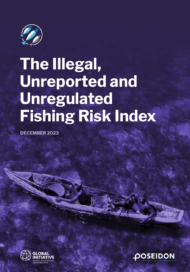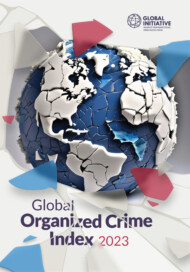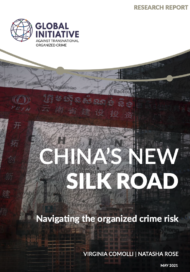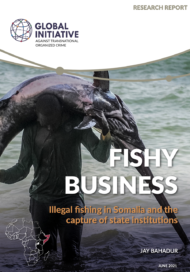Posted on 16 Dec 2024
Since 2018, global seafood consumption has doubled and is expected to double again by 2050. In response to this increased demand, the fishing industry has developed through advances in vessel design, refrigeration and navigation systems, which allow fishing vessels to stay at sea longer and to travel greater distances. Thanks to hefty state subsidies (reaching US$7 billion in 2018), today China has the world’s largest and most far-reaching fishing industry, with a distant-water fleet that dwarfs those of other countries. China also owns or runs fishing terminals in more than 90 ports.
But China’s dominance at sea comes at a high human and environmental cost. According to the Global Organized Crime Index, China is a major hub for human trafficking and forced labour, and these criminal activities have also been detected within its fishing fleet. In 2023, the country scored 7 out of 10 for human trafficking, a 0.50 increase since the 2021 Index, and 9 out of 10 for fauna crimes, which include activities related to illegal, unreported and unregulated (IUU) fishing. IUU fishing increases the vulnerability of workers in fishing fleets and puts the marine ecosystem at risk. In 2022, a European Parliament report found that half the vessels identified as participating in IUU fishing were flying Chinese flags.
According to the UN’s International Labour Organization, in 2021 at least 128 000 fishers were trapped in forced labour aboard fishing vessels worldwide. Abuse of these workers is common, with Chinese squid ships being among the most brutal. An investigation by the Outlaw Ocean Project, a non-profit journalism organization based in Washington, found a pattern of human rights abuses on the Chinese ships that were part of the study. Abuses included debt bondage, the withholding of wages, confiscation of passports, lack of timely access to medical care, violence and excessive working hours of 15 hours per day, six days a week. Crew members were found to suffer from injuries, malnutrition and other illness.
Labour and human rights abuses are also found in China’s processing plants that are supplied by the fishing vessels. Over the past decade, the Chinese government has been forcibly relocating tens of thousands of workers from the Uygur ethnic community, sending them to seafood processing plants in the Shandong province, a fishing hub on the eastern coast. In 2022, the Office of the UN High Commissioner for Human Rights flagged forced labour practices in China, where coercion was used to transfer Uyghur ‘surplus labourers’ to processing plants, while the International Labour Organization expressed ‘deep concern’ over China’s labour policies in Xinjiang.
Through a search of company documents and state media stories, the Outlaw Ocean Project’s investigation revealed that over the past five years, more than 1 000 Uyghurs and other Muslim minorities were sent to work in at least 10 seafood processing plants in China. The investigation also found that workers from North Korea are sent to work in Chinese processing plants, mainly in the Liaoning province. For 30 years, the North Korean government has sent citizens to work in factories in Russia and China, and taken 90% of their earnings to deposit in government-controlled accounts. As of November 2022, more than 80 000 North Koreans were employed in Chinese border cities, including hundreds in seafood plants.
As demand for seafood exceeds supply in many European countries, China has stepped in to fill the gap. In 2022, China was the largest non-European supplier of seafood to the EU. At the same time, the Outlaw Ocean Project’s investigations have linked Chinese fishing vessels that use forced labour to distributors of seafood into countries such as France, the UK, Germany, the Netherlands, Switzerland, Finland, Belgium, Sweden and the Czech Republic. Using satellite tracking, investigators have traced the movement of squid from Chinese fishing ships to refrigeration ships and back to China for processing. Seafood from at least 10 processing plants in China linked to human rights and labour crimes were found to have been distributed to supermarkets, restaurants and food service companies in the EU and the US. Many European countries have also purchased seafood from companies that source products from processing plants using Uyghur forced labour.
The UK, France, Germany and Norway have passed anti-human-rights abuse legislation in an attempt to pressurize companies to address slavery risks in their supply chains. In the US, the Uyghur Forced Labor Protection Act applies restrictions to the import of goods produced in Xinjiang due to the legal presumption that all commodities ‘wholly or in part’ from the province are derived from state-imposed forced labour. American trade agreements with its neighbours Canada and Mexico require these countries to implement their own import bans comparable to the US Withhold Release Order process. These orders enable customs officials to block goods produced with forced labour from entering the US.
In an attempt to address gaps in the regulation of imported goods, the EU has proposed two pieces of legislation. The first one is similar to the due diligence legislation in countries such as France and Germany, and puts pressure on large companies across member states to assess forced labour risks in their supply chains. The second law seeks to prohibit products made using forced labour from entering member countries and applies to goods tied to any kind of forced labour, including Uyghurs and others.
However, past implementation of measures is not cause for optimism. Since 2010, the EU has used a carding system to penalize countries exporting seafood that is tied to illegal fishing or other crimes. A yellow card serves as a warning and, if the country fails to take action in time, it is issued a red card, meaning a ban is imposed of all imports of seafood from the country. According to the European Parliament, despite ‘considerable evidence of its significant and growing involvement in IUU fishing’, China has never been issued a yellow or red card by the EU. Without robust legislation and effective enforcement, Europe remains at high risk of becoming a ‘dumping ground’ for seafood sourced or produced in violation of human rights and fishing regulations.
This analysis is part of the GI-TOC’s series of articles delving into the results of the Global Organized Crime Index. The series explores the Index’s findings and their effects on policymaking, anti-organized crime measures and analyses from a thematic or regional perspective.
This story was produced by The Outlaw Ocean Project, a non-profit journalism organization in Washington, D.C. Reporting and writing was contributed by Ian Urbina, Daniel Murphy, Joe Galvin, Maya Martin, Susan Ryan, Austin Brush and Jake Conley.



